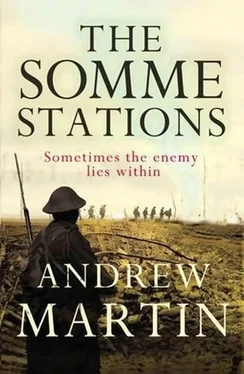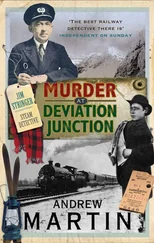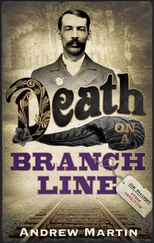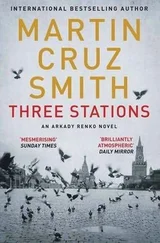And yet it was as though my Jim did not know his part in the play or the film, for he remained upright, and it was the man with the gun who had fallen at the very moment of firing. It was then that I saw a thirdman on the Moor: Weatherill, the Chief Inspector. He had shot the man who had fired at Jim.
He – Jim’s Chief – was making slowly towards Jim with his own gun carried loosely, while I ran pell-mellin the same direction, and some of the fitter men from the house came streaming up the hill after me, having heard the shot. The faster I moved, the slower the man Weatherill did, and I saw him come to a stop in the falling snow, and light a cigar.
The first small man – the stranger – had completely missed Jim, but had been terribly wounded by Weatherill’s shot. He was carried into the house, and when I saw him in the light I realised that his coat was quite soaked in blood, so that when they took it off him, and lay it down on the floor of the hall, the blood continued to flow from it, just as it was flowing from the man himself.
Oldfield, the Matron, telephoned through to the hospital for an ambulance as Weatherill screamed questions at the man, who was obviously in agony. I saw on the floor a paper that had dropped from his coat. It was half covered in blood, but I could make out that it was a certificate from the railway company addressed to ‘Thomas Shaw, Engine Driver’. In spite of the blood, I caught it up, and did not know whether to give it to the shot man, or to Weatherill, or to Jim. In the event, I gave it to Jim. It began, ‘You are hereby informed that your services are required in connection with the working of the railway. You will not, therefore, at present be required to join the army…’
Jim and Weatherill then left with the man in the ambulance. Jim’s guard here, Brewster (I have told you of him before), was quite happy to let Jim go, and it is clear that what this man Shaw has to say – if anything, for he seemed hardly capable of speech – could have an important bearing on Jim’s case.
Not much else is clear, I’m afraid.
I will write to you again tomorrow, dear.
You will of course not mention a word of this to the children.
With love,
Lydia.

In the library of ‘Ardenlea’, a fellow was giving a Gramophone Concert for the benefit of the invalids. The fellow – whose name I do not recollect – had a lot of gramophone records and a lot of very strong opinions about them. First of all, he liked all his gramophone records – there wasn’t a dud amongst them, evidently – and he was particularly keen on the symphonies among them. The symphony was the highest expression of the musical art. He had just given part of ‘something new from Elgar’, with whom he was on terms of the closest friendship, or so you would have thought from his talk. At the end of it, he lifted the needle and said, ‘Well, that’s woken you all up.’ But it hadn’t. The two men nearest the fire – two Marines, late of the Chief Mechanical Engineers’ Office at York, who’d been shelled and badly burned in the same armoured car – were fast asleep, in spite of all the loud parts.
But then it was a very good and soothing fire that was burning in the library.
The symphony man was now taking out a record by Brahms. He blew the dust off all his records before playing them, even though there was quite obviously no speck of dust on them.
‘Now Brahms, gentlemen,’ he said, ‘was German.’
‘Poor show,’ said Major Dickinson, but he did not wheel himself out of the library, which he very easily might have done. In fact, he and the record man nodded at each other, just as though this little exchange had gone perfectly to plan.
The man put the needle down on the record, and sat in the chair he had placed next to the gramophone. He bent his head as the music started, as he always did, out of respect to the composer, as I supposed. But I did not care for Brahms, who was even keener on the quiet-then-suddenly-loud business than Elgar. The man’s music seemed to go with clattering of one of the nurses as she came in with the cocoa, and it reminded me that a library ought to be silent.
I lit another cigarette and removed myself mentally from the library…

… That morning, the wife had come into my room with her portmanteau in her hand, and an opened envelope tucked into the belt of her skirt, and I could see it was an army envelope. ‘Sorry for opening this,’ she said, being not in the least sorry.
She held the envelope over the counterpane of the bed, upended it, and three little cloth squares fell out directly. The letter floated down a moment later. Well, the pieces of cloth were diamond-shaped rather than square, and I showed the wife how they would fix onto a tunic sleeve.
‘Captain Stringer,’ she said, and she stood back, marvelling at me.
‘A field commission,’ I said, ‘they’re pretty rare.’
‘As an officer,’ said the wife, ‘if you came into the soldiers’ buffet at the station and had cakes with your tea on a Sunday afternoon, you’d have the silver service.’
‘That’s a big if,’ I said.
Leaning suddenly forward, she said, ‘What on earth did you do to deserve it?’
‘Search me,’ I said.
‘It’s all very well to be modest,’ she said, ‘but I don’t think you should be saying things like “Search me”. Not as a captain.’
In fact, I knew. This was the doing of Muir, the officer with the notebook. He had observed – and noted – my rescue of the train and its load of shells from the German bombardment. I’d saved a pretty big bang there. Or rather, Tinsley had, with my assistance.
The wife said, ‘Today, Harry gives a talk on the book – in front of the whole school.’
‘ The Count of Monte Cristo ? Will he talk about the book or the hole in the book?’
‘Both. And about how it saved your life… which he believes it did, at any rate.’
My tale about the book had never really ‘taken’ with the wife.
She caught up her portmanteau. She was leaving ‘Ardenlea’ for good, and I would soon be doing likewise…

In the library, the nurse was continuing with her clattering, in that she was going around the room closing the curtains, and so concealing the total blackness beyond. In fact, it was probably snowing. The stuff had been coming down for days – fast and silent, a mysterious but generous offering. It was also snowing at the Burton Dump, Oamer had written to tell me, in a note that congratulated me on my commission. The push was now on for a spot called Beaumont Hamel, which was a little way to the north, requiring new branches from the existing ‘main line’.
Brahms was not being very well received. One of the Marines – Howell – had set down his cocoa and gone over to the shelf where the bound volumes of Punch were kept. The record man took the hint, and said that by way of closing his programme of music he would give us a rest from crashing and banging (well, he didn’t quite put it like that), and would play us ‘one of the Nocturnes by Debussy’. This was not a symphony, which suited me, and Debussy was French, which suited Major Dickinson. Nocturne meant ‘of the night’ – my French was up to that much – and the record man explained that this particular piece was called by a word I can’t recall that meant ‘Clouds’.
Читать дальше














